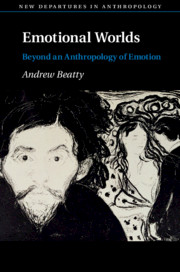Book contents
- Emotional Worlds
- New Departures in Anthropology
- Emotional Worlds
- Copyright page
- Dedication
- Contents
- Preface and Acknowledgements
- Introduction
- Part I Groundings
- Part II Narrative
- Four The Case for Narrative
- Five Persons and Particulars
- Six The Narrative Understanding of Emotion
- Seven Writing Emotion
- Part III Perspectives
- Conclusion
- References
- Index
Five - Persons and Particulars
from Part II - Narrative
Published online by Cambridge University Press: 14 January 2019
- Emotional Worlds
- New Departures in Anthropology
- Emotional Worlds
- Copyright page
- Dedication
- Contents
- Preface and Acknowledgements
- Introduction
- Part I Groundings
- Part II Narrative
- Four The Case for Narrative
- Five Persons and Particulars
- Six The Narrative Understanding of Emotion
- Seven Writing Emotion
- Part III Perspectives
- Conclusion
- References
- Index
Summary
- Type
- Chapter
- Information
- Emotional WorldsBeyond an Anthropology of Emotion, pp. 125 - 149Publisher: Cambridge University PressPrint publication year: 2019



